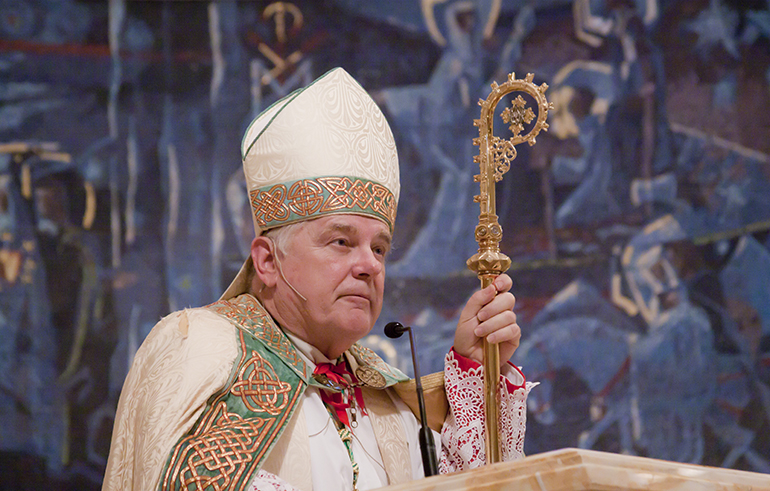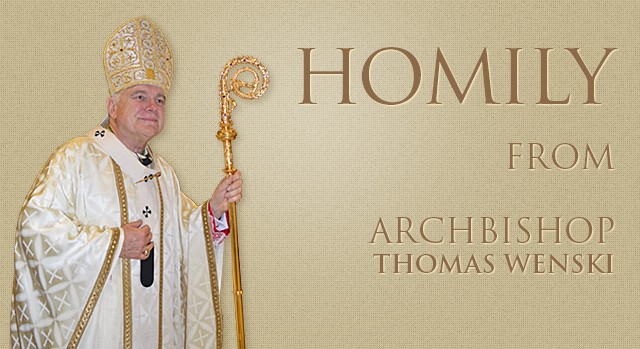By Archbishop Thomas Wenski - The Archdiocese of Miami

Photographer: JONATHAN MARTINEZ |FC
Archbishop Thomas Wenski gives the homily at the prayer vigil for peace in the Middle East, which took place Sunday, April 26, at St. Mary Cathedral.
Archbishop Thomas Wenski's homily at prayer service in solidarity with the Christian communities throughout the Middle East who are suffering persecution for their faith. St. Mary Cathedral, Sunday, April 26, 2015.
This evening we gather to pray for the various Christian communities of the Middle East. Today, Christianity is at risk of disappearing from the region in which the gospel was first preached. We pray especially for the plight of Christians in the Middle East but we are not indifferent to those Christians suffering in other parts of the world, especially in the Asia subcontinent and in Africa. We also remember before the Lord all victims of all faiths who suffer violence and even death because of their religious convictions or identity.
As Pope Francis has pointed out the Age of Martyrs did not conclude with the Peace of Constantine. In fact, there are more martyrs today than there were in the first centuries of the Christian faith. In the 20th Century, some 45 million Christians died because of their faith. And while all atrocities are committed against peoples and institutions of all the world’s religions, the International Society for Human Rights estimates that 80% of all acts of religious discrimination in the world today are directed at Christians.
15 years into the 21st Century, some 150,000 Christians are killed for the faith every year. What perhaps distinguishes what happened in the 20th century from what is happening now is that in the 20th Century religion was persecuted by essentially God-less ideologies but in the 20th centuries some of the greatest crimes are being perpetrated by those who claim to be acting in the name of God.
In the year 2007, at a meeting with leaders of the Muslim, Jewish and other world faiths in Naples sponsored by the Sant’Egidio community, the then Pope Benedict said:
"In a world wounded by conflicts, where violence is justified in God's name, it's important to repeat that religion can never become a vehicle of hatred, it can never be used in God's name to justify violence," he said." On the contrary, religions can and must offer precious resources to build a peaceful humanity, because they speak about peace in the heart of man."
Today we pray for the persecuted – that God may comfort them and sustain their hope; we also pray for the persecutors – that God may change their hearts and minds.We also pray for ourselves – that God may strengthen us in our own religious practice and not allow us to remain indifferent to the plight of our brothers and sisters in need.
We pray for peace recognizing that peace can only be built on the solid foundations of respect for human rights. Religious freedom – the right of every person to establish a relationship with God in the intimacy of his or her conscience – is the human right that guarantees all other rights. Thus, peace anywhere and everywhere requires religious freedom.
Countries with greater religious freedom are generally more peaceful – and this is true even in those rare countries in the Middle Easter where there is greater religious freedom. As Archbishop Silvano Tomasi, representing the Holy See before the UN Human Rights Council in Geneva said: “…religions are communities based on convictions and their freedom guarantees a contribution of moral values without which the freedom of everyone is not possible”.
Today, as we pray for our brothers and sisters in the Middle East, and for all those who suffer persecution throughout the world, we reject all violence in the name of God. And at the same time, we assert that the blame for such violence is not religious faith in general or any religious faith in particular. It is found in that corruption of the human heart called sin. To kill in the name of God is blasphemous sin.
We cannot forget that the religious dimension of the person is part of human experience in all cultures and social contexts. Therefore, instead of hostility towards religion a correct relationship between religious norms and the public sphere can and must be articulated. It is in such a correct relationship, that fosters a mutual openness between believers of different religions and non-believers of good will, the promotion of the common good and peace can be promoted. Saint John Paul II speaking from his own personal experience having lived under the repression of religion in a Marxist-Leninist state taught that: “Dialog between cultures, a privileged means for building the civilization of love, is based upon the recognition that there are values which are common to all cultures because they are rooted in the nature of the person. These values express humanity’s most authentic and distinctive features. Leaving aside ideological prejudices and selfish interests, it is necessary to foster people’s awareness of these shared values, in order to nurture that intrinsically universal culture ‘hummus-soil’ which makes for fruitful and constructive dialog.”
As we pray for peace and for the protection of religious minorities in the Middle East and elsewhere, we must commit ourselves to reject hatred for all religions hold hatred as contrary to God’s will. In an increasing secularized world, people of Faith must seek to build bridges of understanding and not walls of division and mistrust. If there is to be peace, we must discover the common values that unite us for those values can promote social cohesion among those of different faiths and belief systems and thus allow for peaceful coexistence built on the respect for the religious freedom of all.

